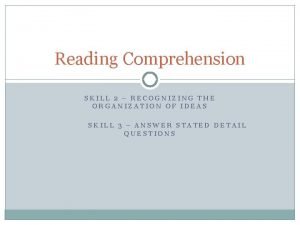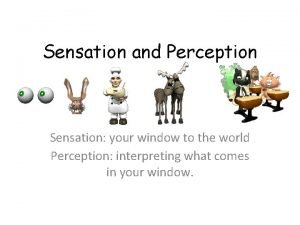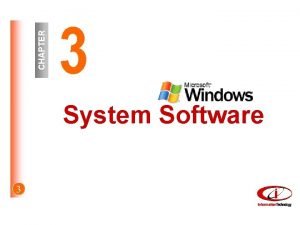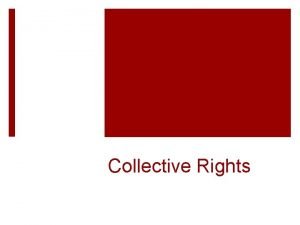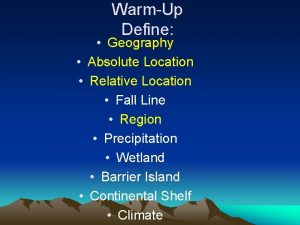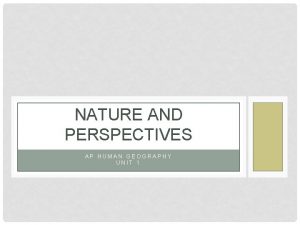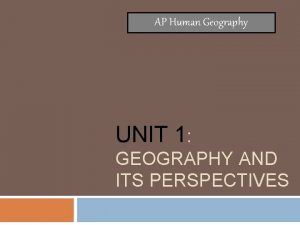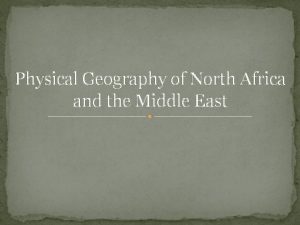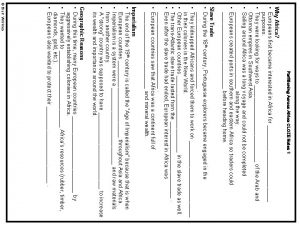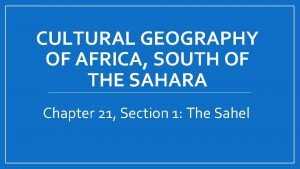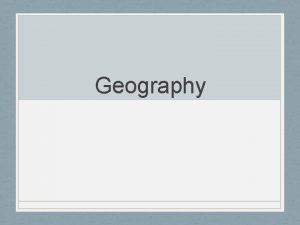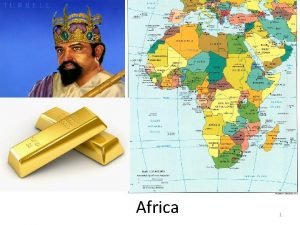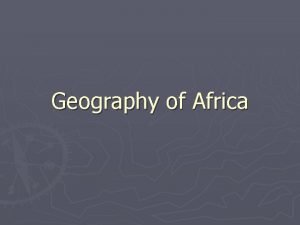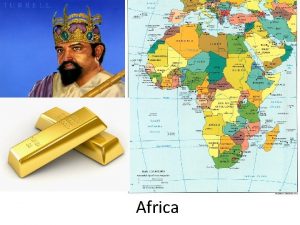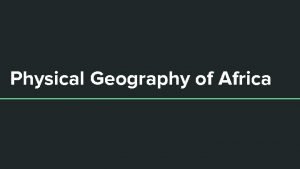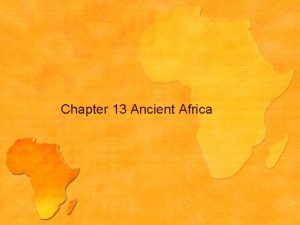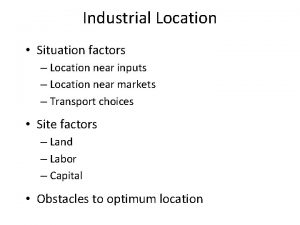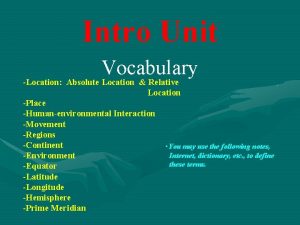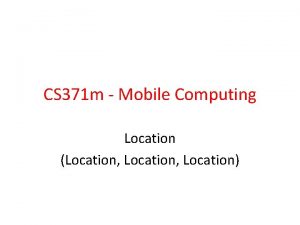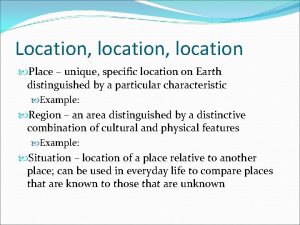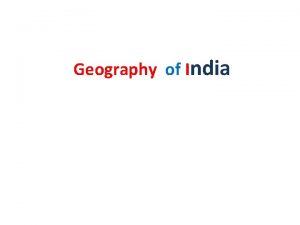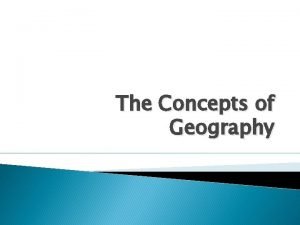Africa Do you recognize this location Geography Africa


























- Slides: 26

Africa

Do you recognize this location?

Geography • Africa is made up of several regions, including the Sahara and Sub-Sahara. • The Sahara is a desert; it takes up ¼ of the African continent. • The Sub-Sahara is a plateau. • Important rivers in Africa include the Congo, Niger and Zambezi.

Kingdoms of Axum and Zimbabwe


Important Facts of Axum • Axum was an important African nation from about the 100 s A. D. until the 700 s A. D. - Axum straddled important trade routes – the Nile and the Ethiopian Highlands - Kush (neighboring kingdom) influenced Axum

• King Ezana converted to Christianity (in the 300 s A. D. ), helping Christianity to become a powerful influence in Africa. Christianity is the foundation for the Ethiopian Church. • Axum was a center of trade throughout East Africa. That brought great wealth.

The Fall of Axum • Axum declined in power for several reasons: a. Erosion made the land less productive b. Persians gained control of trade c. Islamic Arabs competed with Axum, which declined as a commercial power.


Zimbabwe (c. 1300 s to 1400 s A. D. ) • On the coast of East Africa, where Swahili is spoken, several powerful city-states arose. One was Zimbabwe: - located near the Zambezi and Limpopo Rivers - Important location for trade

• In Zimbabwe, they traded gold for essential goods. • Great Zimbabwe became the capital of this prosperous empire. • However, the population grew too fast, leading to dwindling supplies of food and water and the ultimate decline of Zimbabwe.

Kingdoms of Ghana, Mali and Songhai *Gold and salt were important to the trans-Saharan trade


Ghana (c. 300 s to 1235 A. D. ) • Ghana was the earliest of the West African kingdoms Ghana: located in West Africa, near the Niger River - It became powerful and wealthy from the gold trade. - the Soninke people influenced Ghana (b/c of trade)

• Eventually, the neighboring Malinke people overthrew Ghana and established Mali.


Mali (c. 1230 s to 1400 s A. D. ) • Mali was located near the Niger River. It participated in the same trade as Ghana. • Mali’s most important ruler was Mansa Musa. He was important because: a. He supported education, the arts and public building b. He helped make Timbuktu into a leading center of learning and trade c. He made a pilgrimage to Mecca (Muslim tradition)

The Fall of Mali declined in part because of arguments over Mansa Musa’s successor. Then, Sonni Ali (rebel leader) captured Timbuktu and built up Songhai.


Songhai (c. 1468 to 1591 A. D. ) Songhai centered around the city of Gao, near the Niger River. Sonni Ali and Mohammed I Askia built Songhai into a strong kingdom. Timbuktu was known as a city of trade. Internal conflicts weakened the kingdom. Troops from Morocco destroyed the empire.

Trade

Trade Routes and Patterns • Many trade routes developed from Asia to Europe. These trade routes included: a. The Silk Road which stretched from China, across Asia to the Mediterranean basin b. Maritime routes across the Indian Ocean c. Trans-Saharan routes across North Africa d. Links from N. Europe to the Black Sea e. River and sea routes across W. Europe f. Routes between the South China Sea and southeast Asia

• These trade networks/routes aided in the exchange of goods, technology and ideas between Europe, Africa and Asia.

• Examples of goods exchanged include: a. Gold from West Africa b. Spices from lands around the Indian Ocean c. Textiles from India, China, the Middle East and later Europe d. Porcelain from China and Persia e. Amber from the Baltic region

• Examples of technology exchanged include: a. Paper from China through the Muslim world to Byzantium and Western Europe b. New crops from India (ex. For making sugar) c. Waterwheels and windmills d. Navigation – Compass from China, lateen sail from Indian Ocean

• Different religious ideas spread across the Eastern hemisphere. Ideas include: a. Buddhism from China to Korea and Japan b. Hinduism and Buddhism from India to Southeast Asia c. Islam into West Africa, Central and Southeast Asia 6. The ideas of printing and paper money also spread from China.
 A cross country skier moves from location a
A cross country skier moves from location a Chapter 8 location planning and analysis
Chapter 8 location planning and analysis What does kat fear will happen if she wins
What does kat fear will happen if she wins Organization of ideas in reading
Organization of ideas in reading Skill 2 recognize the organization of ideas
Skill 2 recognize the organization of ideas Israel palestine
Israel palestine How to recognize opportunity in business
How to recognize opportunity in business Left realists recognize street crime as
Left realists recognize street crime as Chapter 17 oral pathology short answer questions
Chapter 17 oral pathology short answer questions Lars didn't recognize patrick logan because
Lars didn't recognize patrick logan because Cones and rods are to vision as ____ are to audition
Cones and rods are to vision as ____ are to audition Resolution 435 of the prc
Resolution 435 of the prc Objectives of an operating system
Objectives of an operating system Classifying household materials
Classifying household materials Graphing polynomial functions
Graphing polynomial functions Refusing to recognize an emotion or problem
Refusing to recognize an emotion or problem What are beowulf's thoughts as he waits for grendel
What are beowulf's thoughts as he waits for grendel Canadian collective rights
Canadian collective rights Define relative location
Define relative location Location
Location Mathematical location ap human geography
Mathematical location ap human geography 5 themes of geography location definition
5 themes of geography location definition Formal region example
Formal region example Physical features of the middle east map
Physical features of the middle east map European partitioning in africa answer key
European partitioning in africa answer key Africa geography unit test study guide
Africa geography unit test study guide Africa south of the sahara map
Africa south of the sahara map




